Guide to Software Development for Startups in Canada
Table Of Content
Published Date :
05 Jun 2025
Launching a startup is one thing. Building software that actually works and scales is another. In Canada alone, over 2,500 new tech startups are registered every year, and venture funding surpassed $9.5 billion in 2024. The opportunity is massive and the margin for error is very small. Getting the right software development means getting the right growth engine and investor magnet for your startup.
But get it wrong? You’re stuck with delays, budget burn, and a product no one’s excited to use.
Whether you’re still validating your idea or gearing up after your first round of funding, how you build your software will shape everything that follows.
This guide walks you through exactly how to approach software development as a startup in Canada.
What it costs. What process actually works. What tech stacks are smart. How to hire (and who not to). What mistakes kill momentum and how to avoid them.
If you’re looking to hire developers to develop software for your startup, this guide is a must read for you.
Let’s get into it.
What is Startup Software Development?
Startup software development is about building the right product fast, with limited resources and big ambitions. Unlike large enterprises that often have years to plan and roll out complex systems, startups operate under tight deadlines and tighter budgets. It’s a development approach tailored to early-stage companies. That means lean teams, short release cycles, rapid iterations, and features that are tied directly to business goals.
It’s less about building perfect software from day one and more about creating a functional minimum viable product (MVP) that you can test, learn from, and improve. This approach helps startups stay flexible, pivot quickly, and avoid sinking costs into features nobody uses.
In practical terms, startup software development means:
- Prioritizing speed and adaptability
- Using lean, iterative methods like Agile
- Choosing tech stacks that allow fast development and easy scaling
- Building with a clear focus on user feedback and market fit
Think of it as the difference between building a prototype to pitch investors and building a product that onboards your first 1,000 users. Startup software dev helps you do both without wasting resources on the wrong problems.
Building a Startup in Canada? Let’s Talk Code!
Our experts specialize in software solutions tailored to Canadian startups. Get your project moving with the right tech partner.
Why Canada Is a Great Place to Build a Startup
From Toronto to Vancouver and Montreal, it’s a thriving hub where innovation meets opportunity. But why is Canada especially suited for startup software development?
The talent pool is deep. Programs like IRAP and SR&ED offer funding and tax credits that ease the financial pressure startups face, letting you stretch every development dollar further.
Canadian developers are known for their expertise across the latest tech stacks, which means faster builds and fewer headaches when it comes to scaling. The culture also supports collaboration and innovation, making it easier to find partners who understand the startup hustle.
Canada also offers a stable, business-friendly environment with plenty of government incentives, grants, and funding programs tailored for startups.
Software Development Process for Startups
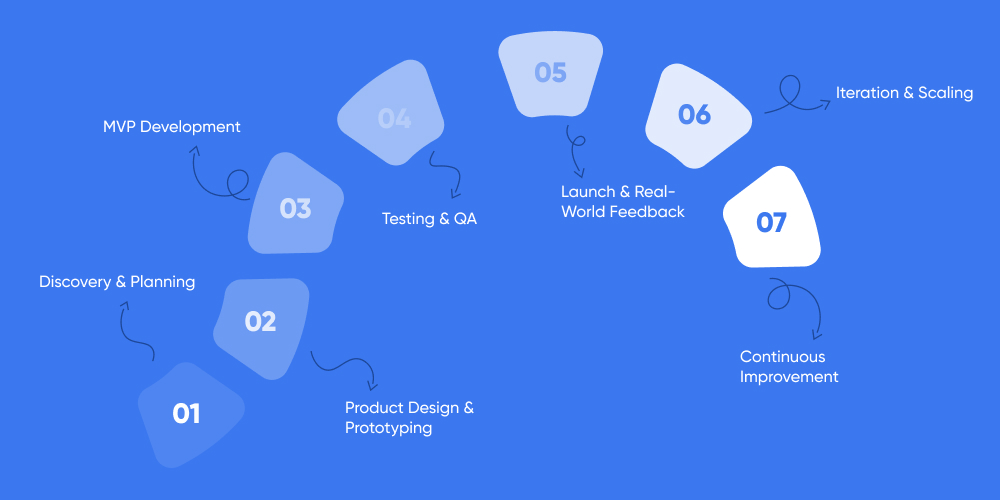
Startups need a development process that is fast, focused, and built for iteration. Here’s what that typically looks like:
1. Discovery & Planning
It starts with understanding the problem. This phase involves defining core goals, identifying user needs, evaluating competitors, and setting clear success metrics.
2. Product Design & Prototyping
Software development firms map user journeys and design wireframes or prototypes for startups in this phase. This minimizes assumptions and allows early feedback before committing engineering time.
3. MVP Development
Minimum Viable Product development focuses on validating your core value proposition with real users before you invest heavily in full-scale development. MVPs are all about launching your idea with the right features directly tied to market demand and user need.
4. Testing & QA
Even for MVPs, quality matters. Automated and manual testing ensure basic functionality, performance, and security standards are met. Bugs caught early prevent larger issues during user onboarding.
5. Launch & Real-World Feedback
Once live, the product’s performance is measured against user behavior and engagement. Early feedback loops are critical to determine what’s working and what isn’t.
6. Iteration & Scaling
Once the MVP is live, the real work begins.
This phase is about turning initial traction into sustainable growth. Every user action now generates insight like what’s being used, what’s ignored, and where the friction lies. Smart startups treat these insights as structured learning:
- Which features are driving retention?
- What’s slowing down conversions?
- Is the architecture ready for 10x traffic?
Based on that feedback, development shifts from experimentation to optimization.
7. Continuous Improvement
The process doesn’t end at launch. For startups, continuous improvement is the discipline of systematically enhancing product performance, stability, and user experience based on measurable outcomes.
This includes:
- Monitoring usage patterns and system performance in real time
- Releasing incremental updates to improve reliability and functionality
- Revisiting architectural choices as user demand grows
- Using feedback loops to inform the product roadmap
This approach reduces long-term technical debt and keeps the product aligned with shifting market needs.
Ready to Launch Your App or Platform?
Whether it's your MVP or full-scale product, we help startups build software that scales.
Benefits of Startup Software Development
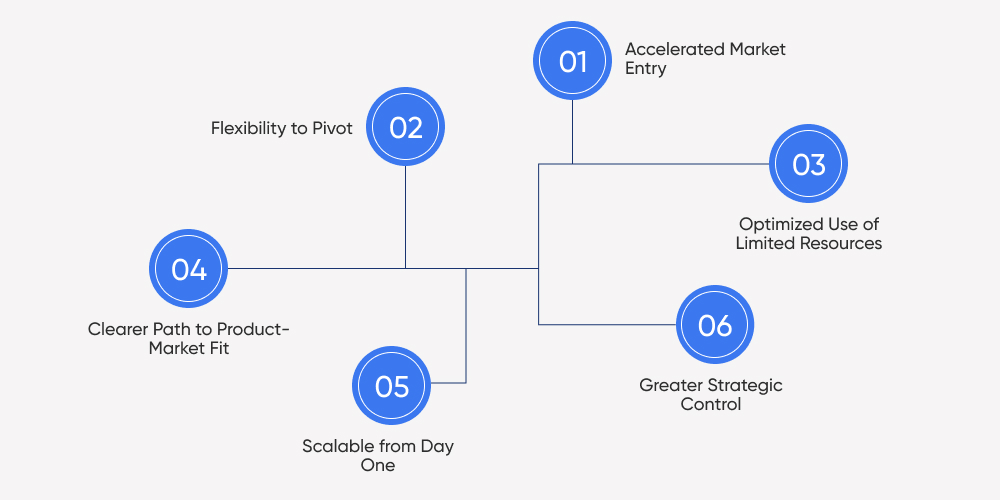
Here’s how a startup-focused development model delivers measurable value:
Accelerated Market Entry: A lean, iterative development process helps teams move quickly from concept to functional product. This validates demand before significant capital is deployed.
Flexibility to Pivot: Early-stage companies often refine their value proposition multiple times. A modular architecture and agile process provide the flexibility to shift direction without rebuilding from scratch.
Optimized Use of Limited Resources: Startup software development emphasizes prioritization. They focus on features that directly support business goals, eliminate waste, and improve return on investment.
Clearer Path to Product-Market Fit: Development is guided by user feedback and behavioral data from day one. This minimizes assumptions and maximizes the likelihood of building a solution that fits a real market need.
Scalable from Day One: While speed is the priority, long-term scalability is never an afterthought. Early architectural decisions are made with growth in mind, ensuring your system can scale as usage increases.
Greater Strategic Control: Custom development gives startups full ownership over their product roadmap, security protocols, and integration capabilities.
Mistakes to Avoid When Building Startup Software
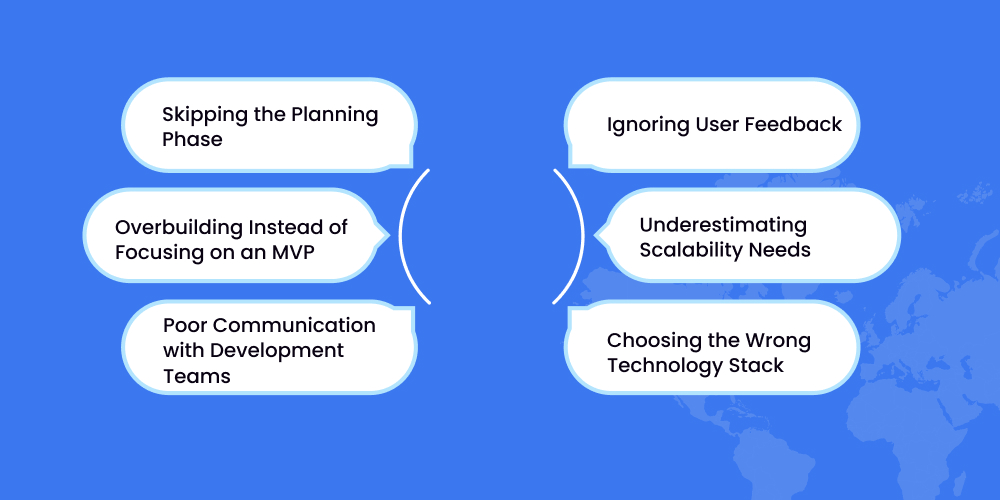
Building software for a startup is a high-stakes endeavor. One misstep can cost time, money, and market position. Avoid these common pitfalls to keep your development on track:
Skipping the Planning Phase: Rushing into development without a clear roadmap or defined priorities leads to wasted resources and feature overload. Take time to align software goals with your business strategy.
Ignoring User Feedback: Developing in isolation is a costly mistake. Early and continuous user input ensures you build solutions that actually solve real problems and drive adoption.
Overbuilding Instead of Focusing on an MVP: Trying to deliver a “perfect” product from day one drains resources and delays market entry. Focus on delivering the minimum viable product, then iterate based on real data.
Underestimating Scalability Needs: Neglecting scalability early can force expensive rewrites later. Build with growth in mind, even if you’re starting small.
Poor Communication with Development Teams: Lack of clear, consistent communication creates misunderstandings, delays, and rework. Establish transparent channels and regular check-ins from the start.
Choosing the Wrong Technology Stack: Selecting tools without considering future needs or your team’s expertise can slow development and limit flexibility.
How to Hire Software Developers for Startups?
Choosing the right development team is a strategic decision that impacts your startup’s trajectory. You typically have three main options: in-house, offshore, or freelance developers. Each option comes with its pros and cons.
In-house teams: They offer deep alignment with your company culture and easier day-to-day collaboration. They’re ideal for startups aiming for tight control over product quality and long-term growth, but come with higher costs and hiring challenges.
Offshore development: This hiring model provides access to a larger talent pool and cost advantages. It works well when you need to scale quickly or fill skill gaps. The trade-offs include time zone differences, communication hurdles, and the need for robust project management.
Freelancers: They offer flexibility and are great for short-term projects or specific tasks. However, relying solely on freelancers can risk inconsistent availability and lack of continuity, which might slow progress in critical phases.
MVP, Scaled Product, or Something in Between?
We help Canadian startups build robust, scalable software—fast and affordably.
How Much Does Software Development Cost for Startups in Canada?
In Canada, startup software development costs typically range from CAD 40,000 to CAD 300,000+, depending on project scope and complexity.
A basic MVP with essential features can be developed for around CAD 40,000 to CAD 100,000, while more complex, scalable solutions usually start at CAD 150,000 and up.
Hourly rates for Canadian developers generally fall between CAD 75 to CAD 150, reflecting high standards in talent and quality.
Many startups control budgets by breaking development into phases and validating assumptions before scaling investment.
Why Choose Ditstek for Startup Software Development
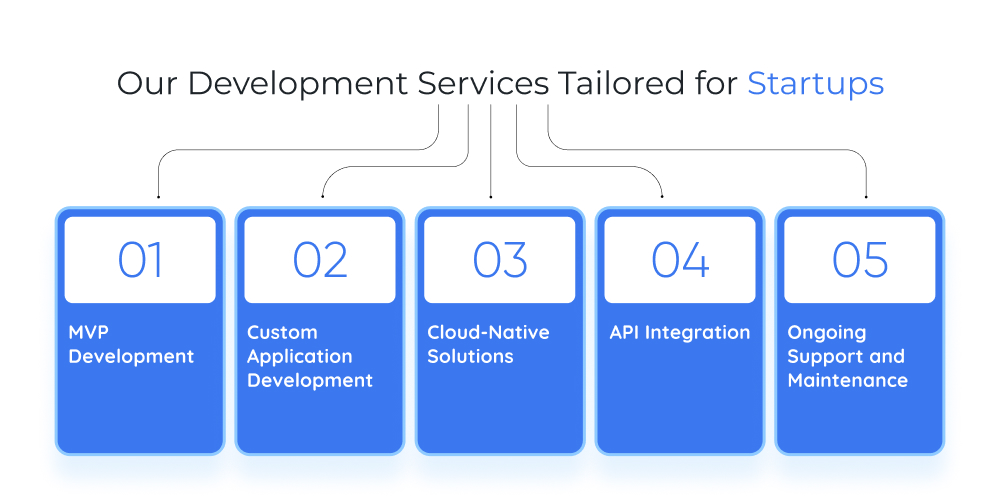
At Ditstek, we understand that startups operate under the pressure of tight budgets, fast timelines, and the need for flexibility. That’s why our approach centers on delivering high-quality custom software solutions specifically to your unique challenges.
How We Develop Software for Startups
We follow a lean, agile methodology focused on rapid delivery and continuous feedback. Our teams work closely with your leadership to align development with core business objectives. We prioritize building scalable, maintainable solutions designed to adapt as your startup evolves. Transparency and communication are key. We keep you informed and in control throughout the process.
Our Development Services Tailored for Startups
We offer end-to-end software development services crafted for startup needs, including:
- MVP Development: Quickly bring your core idea to market with a functional, testable product.
- Custom Application Development: Tailored solutions built to your specifications and growth plans.
- Cloud-Native Solutions: Scalable, secure infrastructure designed for rapid expansion.
- API Integration: Seamless connection to third-party services and internal systems.
- Ongoing Support and Maintenance: Continuous improvements to keep your software running smoothly and evolving with your business.
Conclusion
Effective software development is a critical driver of startup success in Canada. It requires a strategic approach that balances agility, cost management, and long-term scalability. Prioritizing a well-defined MVP, maintaining clear communication, and avoiding common missteps can significantly improve your chances of delivering a product that meets market needs and supports growth.
Partnering with experienced development teams, like Ditstek, ensures access to the right expertise and processes tailored to startup realities. This alignment enables you to focus on business priorities while confidently advancing your technology roadmap.
Ultimately, making informed decisions around software development lays a strong foundation for sustainable growth and competitive advantage.
Frequently Asked Questions (FAQs)
How long does it typically take to develop software for a startup?
Development timelines vary based on complexity but expect an MVP in 3 to 6 months. More complex products or scaling phases may extend beyond that.
What’s the best development approach for startups?
Agile is generally preferred for startups due to its flexibility and iterative nature, allowing faster feedback and adaptation.
How do I control software development costs without compromising quality?
Start with a clear MVP focused on core features, break development into phases, and maintain close communication with your development team to avoid scope creep.
What are the key strategies for successful startup software development?
Focus on building a clear MVP to validate your idea quickly. Use agile, iterative development to stay flexible and respond to user feedback. Prioritize scalable, maintainable architecture from the start. Maintain close collaboration between business and development teams to ensure alignment with your goals. Finally, manage risks by breaking projects into manageable phases and continuously measuring progress.
How do software needs change as a startup grows?
In the early stage, the focus is on speed and building an MVP to test product-market fit. As the startup matures, the priority shifts to scalability, performance, and feature expansion. Later stages often require system integrations, data analytics, and security enhancements to support growth and operational efficiency.
What should startups look for in a software development partner?
Look for a partner with experience developing software for startups. Their teams should understand MVPs, fast iterations, and lean budgets. Technical expertise matters, but so does strategic alignment, transparent communication, and a track record of delivering scalable solutions. The right partner should act as an extension of your team, not just a vendor.

Dinesh Thakur
21+ years of IT software development experience in different domains like Business Automation, Healthcare, Retail, Workflow automation, Transportation and logistics, Compliance, Risk Mitigation, POS, etc. Hands-on experience in dealing with overseas clients and providing them with an apt solution to their business needs.
Recent Posts

Digital transformation in healthcare streamlines operations, reduces administrative waste, strengthens revenue cycles, and enables data-driven decisions that support sustainable cost control and improved care delivery.
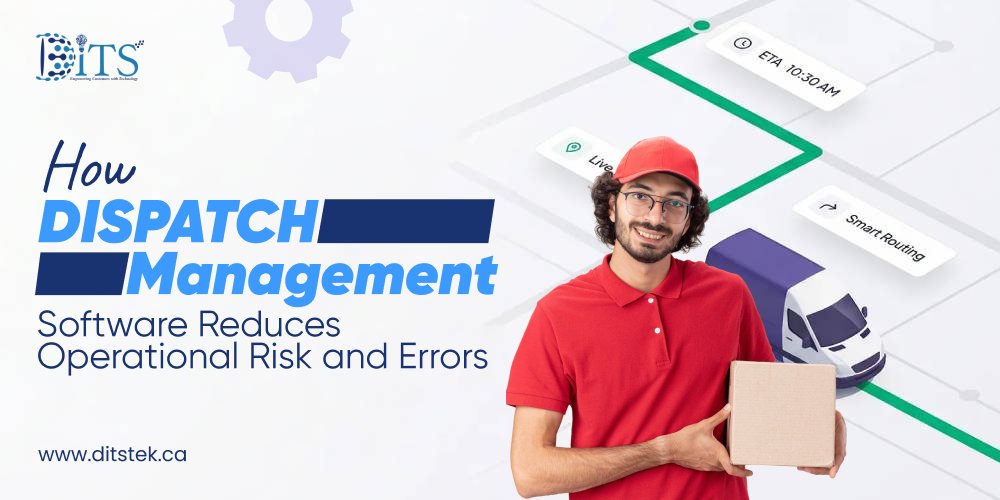
Reduce operational risks and errors by replacing manual, spreadsheet-based processes with dispatch management software.
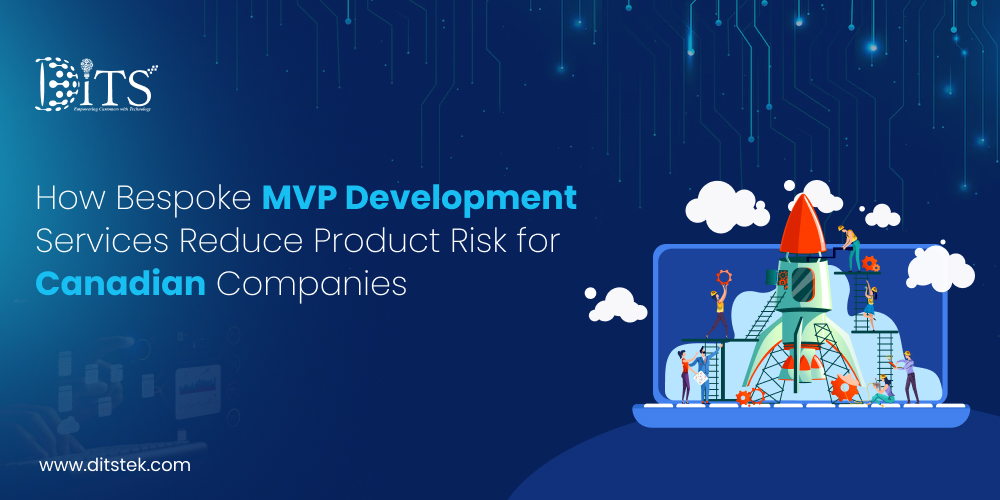
Discover how bespoke MVP development services help Canadian companies reduce product risk, validate ideas faster, and build scalable products with confidence.